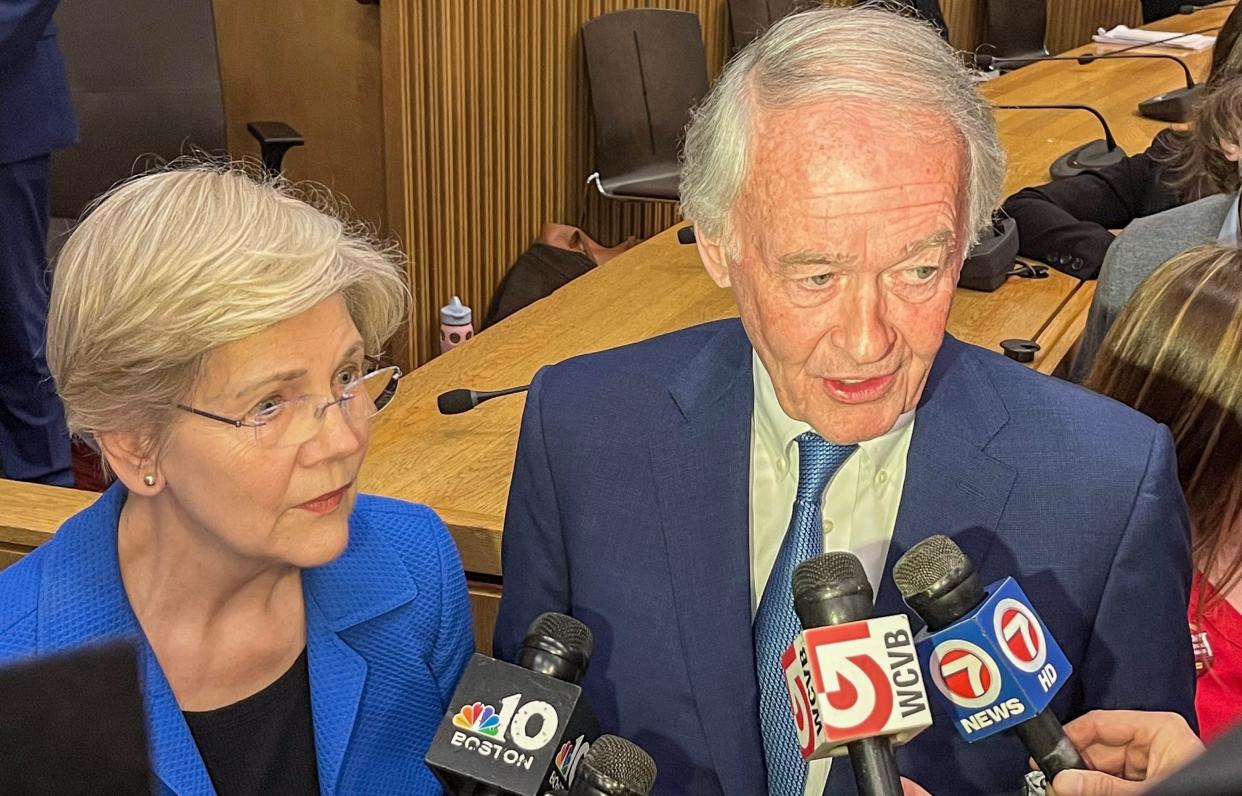For-profit health care companies draw ire for not caring for patients by Warren, Markey
BOSTON — State and federal legislators are looking with renewed urgency to regulate for-profit health care companies — including the corporation that operates MetroWest Medical Center — in wake of Steward Health Care’s financial crisis.
U.S. Sen. Ed Markey, D-Mass., and state legislators recently hosted hearings to address concerns about for-profit health care companies and the weaknesses of current oversight systems. Government agencies had limited power to influence Dallas-based Steward — which owns nine Massachusetts hospitals — as the for-profit company faced allegations of mismanagement and refused to turn over financial documents.
Another for-profit company, Dallas-based Tenet Healthcare, owns MetroWest Medical Center (Framingham Union Hospital and Leonard Morse Hospital in Natick), the MetroWest Wellness Center in Framingham and Saint Vincent Hospital in Worcester. Tenet has had a strained relationship with Massachusetts residents, localofficials and the nurses union, each of whom has cited diminished services, layoffs and safety concerns.

'In the red 36 months': MetroWest Medical Center credits corporate owner for cash infusions
“Steward is representative of a larger pattern of greedy for-profit companies bleeding the health care system dry,” Markey said during a press event prior to his subcommittee’s April 3 hearing. “In Massachusetts and across our country.”
Markey led a field hearing with U.S. Sen. Elizabeth Warren, D-Mass., in Boston titled “When Health Care Becomes Wealth Care.” The lawmakers spoke with expert panelists from Massachusetts and other states about evidence that profit-driven health care ownership can lead to reductions in basic services; places harmful market pressures on nonprofit providers; and results in a lack of transparency with state and federal government.
Health policy researcher says lawmakers must protect patients
Donald Berwick, a health policy researcher and former Medicare and Medicaid administrator, said lawmakers need to protect patients from “gaming and profiteering” in health care.
“At the moment, we are dropping that ball,” he said. “Unchecked — and this is mostly unchecked so far — greed is going to cause disastrous and I think irreversible harm.”

'Complaints have tapered off': Framingham mayor is optimistic that hospital is addressing concerns
Markey and Warren each spoke about their own bills to impose transparency measures and address tax loopholes in the health care industry.
“We need accountability here,” Warren said. “We also need to change the law.”
Tenet executive says negative press has been counterproductive
Tenet did not reply to requests from the Daily News for comment. But during a Framingham City Council meeting in January, the company’s Massachusetts Market CEO, Carolyn Jackson, said that public criticism and media coverage of Tenet and MetroWest Medical Center have been unconstructiuve.
“The current health care landscape in Massachusetts is challenged, especially for community hospitals and regardless of corporate structure,” Jackson said during the Jan. 16 meeting. “We need to stop negative stories about things which create sensationalism.”
During the same meeting, Tenet leadership told Framingham city councilors that MetroWest Medical Center had been financially “in the red” for 36 months.
'Community deserves better': Cancer care deal not enough to sway some MetroWest Med critics
In recent years, MetroWest Medical Center announced plans to close Framingham Union Hospital’s inpatient services for children and some cancer treatments (Tufts Medicine took over the Framingham cancer care, and has maintained services there since last year), as well as shuttering Leonard Morse Hospital’s emergency room (the Natick site is now used for behavioral health services).
The Tenet-owned hospital told state regulators that it made the changes to account for a lack of patient demand in specific departments.
Framingham City Councilor Brandon Ward said residents’ frustrations about program closures and changes are closely related to another issue — understaffing.
“Do they have enough people on shift at any given time? Then, related to that, how are nurses being treated? Are they being appropriately compensated?” Ward asked in an interview. “I think that's a concern.”
MetroWest Medical Center nurses plan to renegotiate contracts in May
Like other hospitals throughout the country, MetroWest Medical Center has struggled to hire and retain nurses after the COVID-19 pandemic. Nurses at the Framingham hospital plan to begin re-negotiating their contracts in May after voting to unionize earlier this year. The nurses union is collecting feedback from members to determine its bargaining priorities.
Ellen MacInnis, a board member of the Massachusetts Nurses Association, said employees are in a “constant struggle” with for-profit health care companies to prioritize patient needs over profit.
“From this perspective of nurses and health care professionals on the front lines, the entry into our state by these providers — whether it was Steward, Tenet or any of the other for-profit providers — has been bad for patients, bad for workers and bad for the community,” MacInnis said during the press event Markey hosted.

Votes are in: Framingham RNs agree to join the Massachusetts Nurses Association
At a recent state legislative hearing, expert panelists warned members of the Legislature’s Joint Committee on Health Care Financing that profit-driven health care models often increase patient costs, reduce staffing and lower the quality of care.
Former Harvard Medical School professor David Blumenthal said market pressures put a strain on health care decision-making.
“The scent of profit in a system that now costs upward of $4 billion should not be discounted,” Blumenthal told the committee. “Even the crumbs from this feast can now make investors rich.”
State official sees 'tremendous opportunity' for more transparency
The legislative hearing focused on private equity firms — which doesn’t include Tenet, a publicly-traded company. But David Seltz, executive director of the state Health Policy Commission, had some broader suggestions to strengthen his agency’s abilities to regulate health care organizations.
“We do see a tremendous opportunity to enhance the public transparency and oversight over a range of emerging market trends — not only specific to private equity,” he said.
Seltz spoke favorably about a bill the committee is considering that would broaden his commission’s power to collect information about major changes to the health care industry and patients’ needs across the state. It would also strengthen the attorney general’s ability to enforce consumer protection laws in the industry.
The hearing also included a presentation about policy examples of health care regulation from other state governments.
California and New Mexico have enacted bills authorizing state officials to grant, deny or impose conditions on acquisitions and transfers of control in the health care industry. Washington state's legislature is considering a similar bill, which would require that major transactions by health care organizations don’t restrict patients’ access to quality and affordable care.
State Rep. John Lawn, D-Watertown, House chair of the Joint Committee on Health Care Financing, said the hearing’s expert testimony was “very helpful” in determining the next legislative steps.
“At the end of the day, what we’re concerned about is patients in Massachusetts,” he said. “That's something the committee and my co-chair will continue to address and talk about over the next few weeks.”
This article originally appeared on MetroWest Daily News: Markey, Warren target Tenet Healthcare for more government oversight
